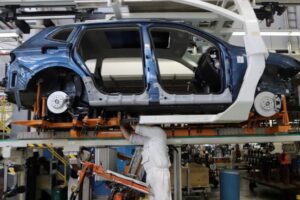Baby-Formula Production Has Restarted at Abbott’s Michigan Plant

has reopened its biggest factory after a shutdown last month that dealt another blow to efforts to replenish the country’s short supply of baby formula.
Abbott on July 1 reopened its plant in Sturgis, Mich., following a nearly three-week closure that stemmed from severe thunderstorms that blew through southwest Michigan, a spokesman confirmed on Sunday. The company has restarted production of its EleCare formula, a formula for babies with digestive issues, and will begin shipping in the next few weeks, said spokesman John Koval.
Mr. Koval said Abbott is working to restart production of its formula Similac as soon as possible.
The company said on June 15 that it stopped production at the plant to assess damage caused by the storm and to clean and sanitize the facility. The company said areas of the plant had been flooded, but didn’t elaborate on what damage may have resulted.
When the storm hit, the Sturgis plant had been open for just over a week following a multimonth closure that began in February, when the Food and Drug Administration found traces of a potentially deadly bacteria, raising the possibility that contaminated products from the plant had caused the illness of several infants. The second closure elevated concerns about shortages that continue in many states despite efforts by the Biden administration to ease the crisis with formula supply from Europe, Mexico, Australia and elsewhere.
The Sturgis factory had produced roughly one-fifth of the infant formula in the U.S. In early June, before Abbott’s most recent plant closure, industry executives said the shortage would persist for several more weeks.
The FDA has said it can’t conclude that contamination in the Sturgis plant caused bacterial infections in at least four babies who consumed Abbott formula since last September, but can’t rule it out either. Abbott has said there was no definitive link between the infections and its products. An analysis by the Centers for Disease Control and Prevention of the genetic sequences of the bacteria from two of the infected babies found they didn’t match each other or the strains found in Abbott’s plant.
The bacteria, cronobacter, can be fatal in infants, causing sepsis or meningitis. Two of the four babies died, federal health authorities said. Abbott agreed to halt production and issue a recall in February 2022. The FDA said in June it is investigating another baby’s death and whether it was linked to Abbott’s formula and potentially unsanitary conditions at the Sturgis plant. An Abbott spokesman has said that there is no evidence to suggest a causal relationship between Abbott’s formulas and this newly reported case.
The FDA didn’t respond to a request for comment on Sunday.
The agency said on Friday that as part of its efforts to increase supply for families that continue to struggle to find formula for their babies, an additional 4.9 million cans of formula from an Australia-based producer would start shipping to the U.S. in the first week of August and will be distributed to as many as 20,000 stores.
Abbott said last month that it expected to produce 8.7 million pounds of infant formula in June for the U.S., or 95% of what it produced in January, before the recall, although this doesn’t represent production from Sturgis. Abbott also is shipping baby formula from Spain and Ireland. According to findingformula.org, a website to help parents track down formula in stores, Abbott’s Similac is among the most plentiful on store shelves, with an estimated 4,600 cans, along with
Write to Heather Somerville at Heather.Somerville@wsj.com
Copyright ©2022 Dow Jones & Company, Inc. All Rights Reserved. 87990cbe856818d5eddac44c7b1cdeb8
Appeared in the July 11, 2022, print edition as ‘Baby Formula Plant Reopens After Storm Shutdown.’









